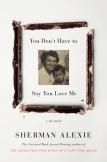A patchwork quilt
Years ago I was asked to help dig the grave of a stranger. He was an old man, who was loved by an old woman, who was loved by a young man, whom I loved. We set out in the Arizona desert of the Navajo Reservation and stabbed at the dry earth with spades that sang as we dug deeper. It was hard and beautiful and painful and grace-filled. Through the process, I felt oddly and inextricably connected both to the deceased and to those who loved him. It is an experience I am unlikely to repeat. But reading Sherman Alexie’s new memoir, You Don’t Have to Say You Love Me, comes close.
Readers looking for a straightforward narrative of the author’s childhood on the Spokane Indian Reservation in Eastern Washington, or of the rural, white farm town where he went to school, or of the cities of the Pacific Northwest where his writing career took off, will not find it in these pages; but the 160 short chapters of poetry and prose reveal plenty of truth. At its core, the book is a reckoning with, a love letter to, a rebuke of and a memorial for Alexie’s mother, Lillian. It is as much about her as about himself, if in fact their lives can be separately considered at all.
Channeling his mother’s renowned quilting skills, Alexie carefully pieces together colorful scraps of his story.
Influenced by Flannery O’Connor and Bruce Springsteen as much as salmon and circle dances, the book also explores Alexie’s struggle with the seemingly incongruous juxtapositions that have made up his experience as a native writer not quite at home in the city or on the reservation. (In the chapter “Your Theology or Mine?” he describes himself as an atheist who is “equally a child of Jesuit and Salish cultures.”)
Channeling his mother’s renowned quilting skills, Alexie carefully pieces together colorful scraps of his story—chapters on brain tumors, gratitude, rape, alcohol, art, politics, God, laughter, fire, basketball, bipolar disorder, anger, family, love—resulting in gorgeous patterns of raw emotion and stubborn hope. He writes: “We continue lovingly despite the crimes committed against any and all of us. How miraculous is that?” If Seamus Heaney “digs” with his pen, Alexie sews with his. It is worth wrapping oneself in the results.
This article also appeared in print, under the headline “A Patchwork Quilt,” in the September 4, 2017, issue.








